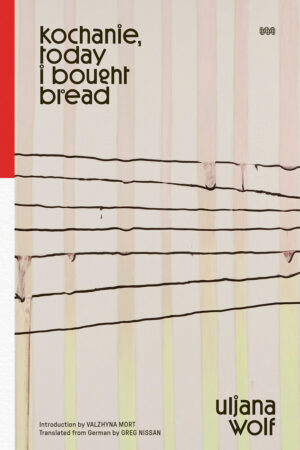kochanie, today i bought bread
by Uljana Wolf (translated by Greg Nissan)
reviewed by Sylee Gore
Uljana Wolf’s debut poetry collection moves across the body, interiors, national archives, and out to forests. Imaginatively translated from German into English by Greg Nissan, it finishes in the ambivalent terrain of railside warehouses and abandoned lands rife with smoke, symbolizing the murky demarcations between languages, cultures, and nations—in particular, the conflicted German-Polish borderlands.
Estrangements come thick and fast: speaker from the body, daughter from father, poet from literary antecedent, human from animal. The question pulsing through these poems is: how to navigate inimical terrain? One way is through an assertion of control over the body. This book’s presiding organ is the mouth, to which Wolf accords dimension and space:
as if you’d
sent your
lungs
a word
coughs
in the mailbox
and the lock
balks at
the key
as if it were
your stubborn
mouth
The mouth is sometimes a mute chamber of possibility and, at other points, the most immediate conduit between the mind and the outside world. Air moves through the chambers of our body to ultimately emerge as puffs of spoken thought—or not. This vacillation between sound and silence is wholly deliberate.
Author Yoko Tawada once compared Uljana Wolf’s poetry to “constellations,” and this collection as a whole is built of brief couplets and short poems no longer than a sonnet. The many micro-poems in this collection—often comprising fewer than twenty words—speak to Wolf’s gift for placing charged bodies of immense density and brilliance in glittering isolation while implying connecting lines. Deprived of words, meaning resides in the interstellar silences. Scattered bodies of light suffice to create lines where there are none, traversing a void.
Today, the infamous silencings of twentieth-0thcentury Germany find a fresh echo in silencings post-dating the 2005 publication of Wolf’s debut collection—making Nissan’s 2023 English version particularly timely. In this book, speech is so lethal that silence is conscripted into eloquence, while the fatherland remains a place where
sir father herr father
treats every word
as treason
This stanza appears in “subplots,” a claustrophobic suite of poems evoking, to the American reader, equal parts Sylvia Plath’s admonitory speaker of “Lady Lazarus” (cautioning a “Herr God, Herr Lucifer” to “Beware / Beware,” a speaker who’ll “eat men like air”) and the braying, deadly “Meister aus Deutschland” of Paul Celan’s poem “Todesfuge.” Wolf writes:
father keeps the word
in his clutches everyone’s
kept at the task: report
the word
In this book of insistently lowercase words, the daughter–hero is left to liberate that word from the fatherland’s clutches.
The Polish endearment kochanie means “beloved” or “sweetheart.” In an interview, Wolf remarked: “I didn’t really grow up with much from my Polish-German Silesian heritage.” Her use of the Polish language speaks to her reclaiming of that heritage—one rooted in the Silesian borderland—in this book. The titular companions in the final section of the book, “krzyżowa, companions,” include “an old bird on the pole” and a “throng of piebald village dogs.” “Krzyżowa” is the Polish name for a village in the Silesia region. A part of Poland since 1945, Silesia has changed hands many times over the centuries, from Bohemia to the Habsburg empire, from Prussia and Nazi Germany to an independent nation under changing sways. Notably, in a move that is full of rich suggestions, the dogs patrolling the village are contrasted with the “companions” insofar as they belong not to Krzyżowa but to Kreisau, which is the German name for the village. Tying the dogs to the German past could represent the German language having gone feral, while also evoking the author’s genealogical inheritance. Dogs have no citizenship, of course, but addressing them as denizens of a place that has been erased from the map serves to highlight the region’s tangled, multilingual past and reminds us of the arbitrariness of mapped borders.
These ideas are potently distilled in “wood lord shaft,” a cycle of poems in fluent dialogue with Shakespeare’s Titus Andronicus—a violent play of debased bodies and family ties:
the father speaks: you map of woe you thrice
bloody folded-over cipher net enmeshed
in the markings of the scribes how shall i
unfold how read how speak for you. shall i
of something other than my pain – you lack
a hand so i’ll let mine fall, felled, hacked
off and if i knew men dug a grave in
your lap (forgive me i don’t find out till
act 4 scene 1) i’d give my ass instead to
aaron’s führer staff i’d let my own folds
cramp and tatter into illegibility the
bodies i say are the misprints of rome
Here as elsewhere, with brilliant evenness, Wolf merges body, map, and terrain into a potent form of text.
Published on September 3, 2024

